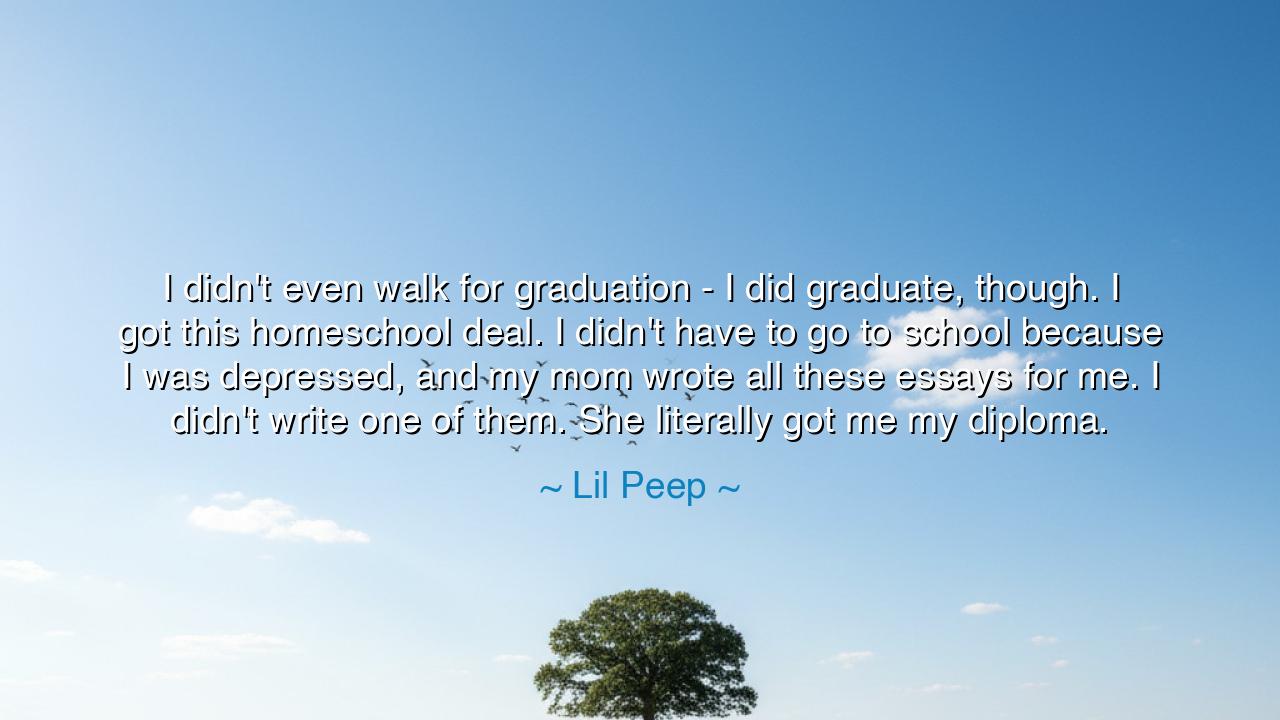
I didn't even walk for graduation - I did graduate, though. I got
I didn't even walk for graduation - I did graduate, though. I got this homeschool deal. I didn't have to go to school because I was depressed, and my mom wrote all these essays for me. I didn't write one of them. She literally got me my diploma.






In the aching and vulnerable words, “I didn’t even walk for graduation — I did graduate, though. I got this homeschool deal. I didn’t have to go to school because I was depressed, and my mom wrote all these essays for me. I didn’t write one of them. She literally got me my diploma,” Lil Peep unveils a truth both haunting and human — the struggle of a young soul drowning beneath the weight of mental anguish and maternal love. His confession is not one of pride, but of honesty — the kind of raw self-revelation that strips away all illusions of success or perfection. Beneath these words lies a cry that echoes across generations: that even in a world obsessed with achievement, there exists a deeper and more urgent need — the need for understanding, compassion, and the will to survive.
The origin of this quote lies in the fractured youth of Gustav Elijah Åhr, known to the world as Lil Peep — a musician whose life burned brightly and briefly. Born in 1996, he grew up in a time when pain often hid behind screens and smiles. His adolescence was marked by isolation, depression, and a deep sense of not belonging. The traditional structures of school and ceremony — those ancient symbols of progress — held no meaning for him, for his battles were not academic but existential. He did not walk across the graduation stage, because at that time, even standing upright in spirit was a victory. His mother, seeing her son consumed by darkness, stepped in — not as an enabler, but as a mother desperate to keep her child afloat in a world that did not yet know how to heal such wounds.
To the ancients, his words would have been understood not as failure, but as a test of the human condition. For every age has known those who walk among us with hearts too tender for the hardness of the world. The Greeks spoke of the poet Orpheus, who wandered between the realms of life and death, singing songs that could calm even the gods, yet unable to save himself from sorrow. Like Orpheus, Lil Peep’s gift was born from pain; his art drew millions because it dared to say what others could not — that sadness, when unspoken, becomes suffocating. His admission about his graduation is not a lament about school, but a mirror reflecting the truth that the systems of man often fail to heal the wounds of the soul.
Yet within his words, there also lives a strange, quiet beauty — the love of a mother who refused to abandon her son. Her act of writing his essays was not deceit, but devotion. She knew that her child did not need discipline at that moment; he needed mercy. In the eyes of the ancients, this would not have been seen as weakness, but as the sacred bond between parent and child — the eternal law of compassion that stands higher than law or rule. For what is the worth of education if it forgets humanity? His mother’s pen was not simply writing papers; it was buying him time, keeping him tethered to life a little longer, hoping that he might one day find his own voice.
Lil Peep would later channel that voice into his music — songs of melancholy and beauty, where despair became melody and confession became courage. He gave shape to his pain and, in doing so, became a prophet for the broken-hearted youth of his time. His story is a reminder that the road to greatness often winds through valleys of suffering, and that not all who stumble are lost — some are simply walking through storms invisible to the rest of us. His graduation without attendance, his diploma written through his mother’s hands — these are symbols not of failure, but of fragile endurance. He made it through, however imperfectly, and sometimes, that alone is victory enough.
The lesson hidden in this confession is not about education or rebellion, but about compassion and endurance. We live in a world that measures success by certificates and ceremonies, yet forgets that the soul has its own curriculum — the lessons of pain, empathy, and survival. Lil Peep’s story reminds us that there are many ways to graduate in life, and not all of them are marked by applause. Some are marked by silence, by tears, by the unseen labor of those who love us enough to carry us when we cannot walk on our own.
And the practical action is this: learn to look beyond appearances. Do not judge the worth of a life by its milestones, nor the strength of a soul by its outward achievements. If you see someone struggling — especially the young, the withdrawn, the unheard — be like Lil Peep’s mother: lend them your patience, your faith, your presence. Help them hold on until they can find their own reason to live. And if you are that struggling soul, know this: you are not defined by the moments you couldn’t stand tall, but by the courage it took to stay alive. For in every act of survival, no matter how small, there lies the seed of redemption — and from that seed, even the most wounded heart may one day bloom into song.






AAdministratorAdministrator
Welcome, honored guests. Please leave a comment, we will respond soon